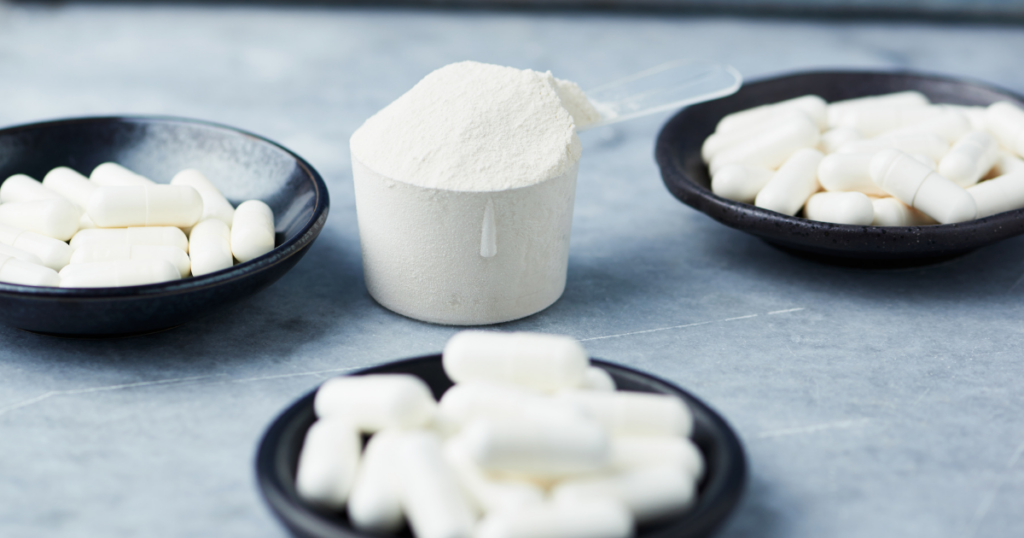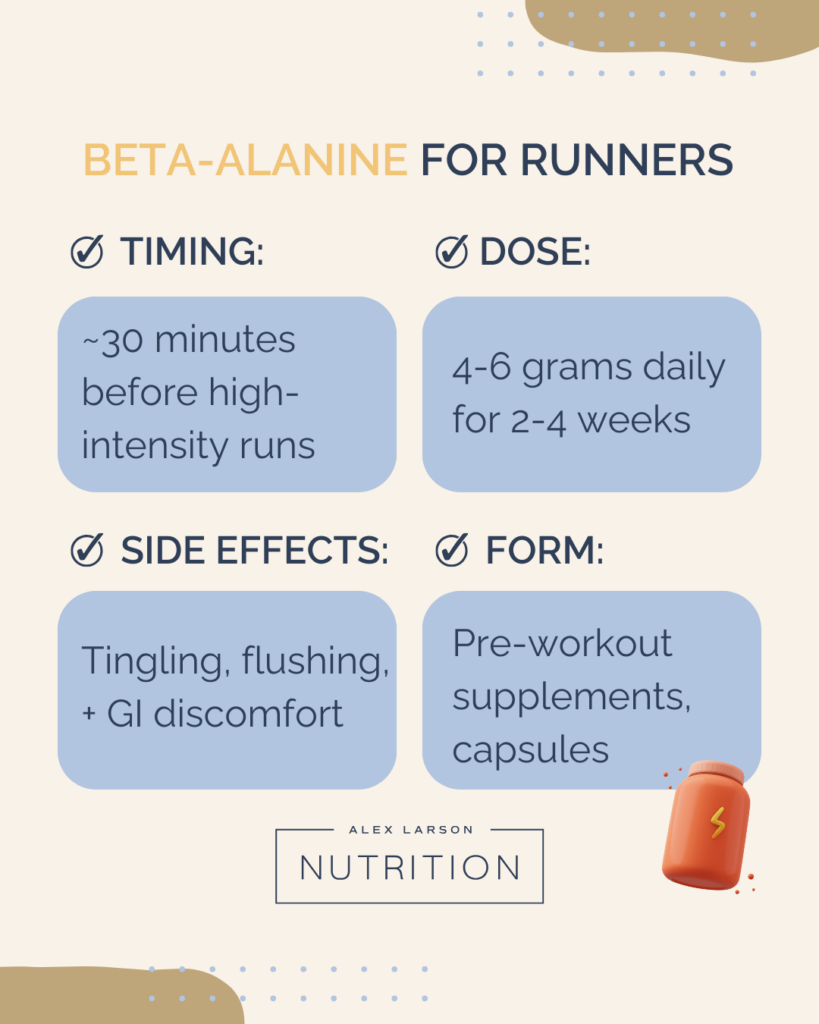RUNNING →
Level Up Your Nutrition Game With Our Freebies
Alex
I provide nutrition coaching for endurance athletes to improve performance and body composition through a simple and flexible eating style.
Hi, I'm
ATHLETE EATING GUIDE →
PROTEIN →
TRIATHLON →
RECIPES →
PERFORMANCE NUTRITION →
SUPPLEMENTS →
HOLIDAY & TRAVEL →
PLANT-BASED →
FEMALE ATHLETE NUTRITION
Explore the Blog
LEARN MORE →
ATHLETE GROCERY SHOPPING GUIDE →
RACE DAY: TRIATHLON NUTRITION PLANNER →
READY TO FUEL?
incredible value!
The fueling guide bundle serves as your one-stop-shop for strategies to fueling before, during and after your workouts.
ENDURANCE EATS
BINGE-WATCH READY!
YOUTUBE SERIES
Here we have yet another trendy sports nutrition supplement that touts a boost in running performance. So apt are athletes to hop on the supplement train and consume any magic elixir that reduces fatigue and improves performance. But before you board the train and add beta-alanine into your daily routine, let’s review the science of beta-alanine for runners.
The Amino Acid Powerhouse: What is Beta-Alanine?

Beta-alanine is a naturally occurring non-essential amino acid that serves as a building block for carnosine, which is found in muscle tissue. Carnosine acts as a buffer against lactic acid buildup during high-intensity exercise, helping to delay muscle fatigue. Supplementing with beta-alanine can increase carnosine levels in muscles, potentially improving athletic performance in short-duration, high-intensity activities. It is commonly found in pre-workout supplements or as a standalone nutrition supplement and is known for causing a tingling sensation when ingested.
The Beta-Alanine Buzz: A Runner’s Secret Weapon
Beta-alanine is an increasingly popular nutrition supplement among endurance athletes, including runners, looking to enhance performance and help offset fatigue. By increasing muscle carnosine levels, this non-essential amino acid helps buffer the acid buildup that occurs during high-intensity activity. The result is improved endurance and possibly faster recovery times. Beta-alanine can be a valuable addition to a runner’s supplement regimen.
Supplementing with beta-alanine for runners has been shown to improve running performance by increasing the concentration of carnosine in muscle tissue. Carnosine acts as a buffer for hydrogen ions, which are produced during high-intensity activities like running or cycling. An accumulation of hydrogen ions leads to a decrease in the muscle’s pH level, contributing to muscle fatigue and a decline in performance. By increasing carnosine levels, beta-alanine helps to delay the onset of muscle fatigue, allowing runners to sustain high-intensity efforts for longer periods of time. This can be particularly beneficial in events that require bursts of speed or sustained power. This includes middle-distance races, sprints, or even long-distance races with varying terrain.
In addition to buffering hydrogen ions, carnosine has antioxidant properties that help reduce oxidative stress during exercise. This may help to improve the recovery process, particularly after harder effort workouts and races. The improved endurance and quicker recovery can be beneficial for runners in both training and competition. However, it is important to note that the effectiveness of beta-alanine for runners may vary from person to person. Typically the benefits are more pronounced in activities lasting 1 to 4 minutes.
The Science Behind Beta-Alanine

Research has shown promising effects for runners who supplement with beta-alanine though the benefits have been pronounced mostly for shorter duration exercise. Additional research is forthcoming and will hopefully include longer-duration events across a wide variety of sports such as running, cycling, and triathlons.
Beta-Alanine Dosage and Timing
Beta-alanine is available in various forms including powder, chewable gummies, liquid, capsules, or chewable tablets. For optimal results, the typical recommended dosage of beta-alanine for runners is around 4 to 6 grams per day, usually divided into smaller doses to minimize the tingling sensation known as paresthesia.
Timing is less critical compared to other supplements like caffeine, but many athletes prefer to take it before workouts to maximize its buffering capacity during high-intensity runs. Consistent supplementation over a period of at least 2 to 4 weeks is generally required to see noticeable improvements in performance.
As this performance nutrition post discusses, it is important to make sure that you are opting for high-quality nutrition supplements. Be sure to purchase a beta-alanine supplement that is third-party tested such as Informed Choice for Sport or NSF-certified. A supplement brand that I love and trust is Thorne Research! You can use this link to get 15% off your order. Unfortunately, there are many low-quality products available that have tested positive for various substances including heavy metals and contaminants.

Potential Side Effects
Before starting any nutrition supplement, including beta-alanine, it’s recommended to consult with your medical care provider. Especially for those with preexisting medical conditions or who are taking other medications. Beta-alanine is generally considered safe but can cause tingling or flushing, known as paresthesia. This is usually harmless but can be uncomfortable for some individuals. High doses may also lead to unwanted gastrointestinal discomfort, which is a lurking threat for many runners. Always follow recommended dosages and consider potential interactions with other supplements or medications.
Incorporating Beta-Alanine into Your Routine
Incorporating beta-alanine into your running routine can be a straightforward process. Start with a daily dose of around 4 to 6 grams, divided into smaller servings. Consistency is key, as it generally takes 2 to 4 weeks of regular supplementation to elevate muscle carnosine levels sufficiently for performance benefits. Taking beta-alanine about 30 minutes before your high-intensity workouts may optimize its effects on endurance and recovery.
Unlike some other nutrition supplements such as creatine, beta-alanine does not typically require a loading phase. That said, the absence of a specific loading phase doesn’t mean that beta-alanine will provide immediate results. It’s more of a long-term commitment to see measurable improvements in endurance and performance.
Other Strategies for Managing Lactic Acid Buildup

It is important to know that there are other strategies for managing lactic acid buildup. As always, it is imperative to stay hydrated for a variety of reasons. But hydration can be key to lowering lactic acid buildup. I encourage endurance athletes to stay adequately hydrated at baseline day in and day out.
According to the National Academy of Sports Medicine, the recommended fluid intake for men is 125-130 oz/day (approx. 16 cups) and 91-95 oz/day (approx. 12 cups) for women. Remember that this number can increase depending on your baseline training duration and intensity. Start tracking your water intake in an app or journal over the course of a few days and training sessions. This will give you a good starting point to make sure you are staying well-hydrated. Remember to include a wide variety of hydrating beverages in your daily routine. This includes water, carbonated water, fruit-infused water, milk and milk alternatives, sports drinks, decaffeinated or herbal teas, and fruit juices, among many others.
There is also forthcoming research that sodium bicarbonate can also be an effective tool for buffering lactate/lactic acid buildup. As with any nutrition supplement, you want to do your research and ensure that you are taking the supplement appropriately. Timing and dosage are important considerations so be sure to study up in advance of starting sodium bicarbonate.
Putting the Puzzle Pieces Together
Beta-alanine is not a quick fix for improving performance. It is up to you as an athlete to make an informed decision about whether beta-alanine is right for you. If you do decide to experiment with it, my best advice is to avoid trying anything new in the weeks leading up to a big race. Perhaps experiment in your off-season to start.
Looking to create an eating style that fits into your active, busy life? My Fueling That Fits Course is perfect for you! In less than six weeks, you will build and design a flexible eating blueprint that showcases how to fuel your athlete’s body. Without interfering with your busy lifestyle! Make sure to check out the course today.
If you need more detailed nutritional guidance, our 1:1 premium nutrition coaching has openings available. Click here to apply today!
Alex
I provide nutrition coaching for endurance athletes to improve performance and body composition through a simple and flexible eating style.
Hi, I'm
LEARN MORE →
take the quiz!
Let's discover your Endurance Nutrition IQ
How well do you know your fueling? Answer these questions and let's see where your endurance nutrition knowledge is at!
Take the quiz
level up your nutrition game with these freebies
free downloadS
Protein-Packed 10-Day Sample Meal Plan
Athlete Eating Guide
Athlete Grocery Shopping Guide
1
2
3
Inspiration to fit 120 grams of protein into your day
Planning what goes on your plate
Putting the right foods in your grocery cart
